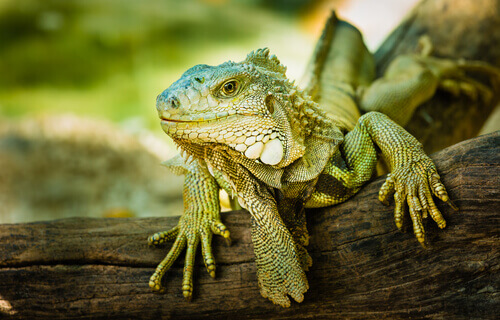What Documentation Do You Need to Adopt an Exotic Animal?

Many people who think about getting a new pet entertain the idea of adopting an exotic animal. More conventional pets like cats already involve a fair amount of paperwork and responsibility, but even more documentation is required to adopt an exotic animal.
Do you want to know everything that’s involved in adopting an exotic animal? Are you curious to know where to start if you decide to do so? You’ll find the necessary information here.
What to consider before adopting an exotic animal
People who want to take the risk of owning an exotic animal often think of species such as snakes, iguanas, chinchillas, spiders and lizards, among others. However, you need to be well informed about certain aspects of pet ownership before adopting one of these animals. As ANNA, the Spanish Asociación Nacional de Amigos de los Animales (National Association of Friends of Animals), says:
The act of adopting or taking responsibility for the life of another living being that will become dependent on you, includes the duty to find out about the characteristics and needs of the species you’d like to get. You’ll need to think about the following things:
What reasons lead me to love this species and this animal?
Is this species suitable as a companion animal?
What are the needs of the species?
Will I be able to keep and care for this type of animal?
Are my circumstances suitable, and do I have the appropriate means to provide this animal with the necessary living conditions to ensure its well-being?

A thoughtless decision
An uninformed, impulsive and thoughtless decision, besides being irresponsible, is the first step on what can become a long life of abusive treatment, meaning any kind of treatment that’s inappropriate for the particular species. Without knowing it, many people with good intentions but bad information can mistreat a pet that they care for immensely.
To adopt an exotic animal as a pet is, in most cases, an act of mistreatment. Before deciding on an exotic species as a companion animal just to satisfy a selfish desire, it’s important to try an empathy exercise. How will that animal feel out of its habitat, far from other members of its species, isolated in a cage or terrarium, and unable to carry out its natural behavior?
In addition to all this, you have to remember that taking an exotic animal out of its habitat can mean mistreatment, not just for that animal, but also for any offspring it may have, since you’d also be contributing to their trade.
So what documentation do you need?
Despite all of this, there are certain exotic animals that can be kept as pets, but you’ll need the documentation and there are certain steps that have to be followed. Let’s learn about them.

There is a convention, known as CITES, which set up controls on the adoption and possession of wild and exotic species, especially endangered animals. This convention requires a would-be exotic pet owner to hold a special permit in order to keep one at home.
The objective of the convention is to regulate the trade of these species. The idea is to ensure that any trade is sustainable and doesn’t endanger either the species or its ecosystem. So, what documentation is required under CITES?
The first thing is an export permit for the animal from the country it comes from. Next is an import permit from the country where you live. If you live in the European Union, for example, the measures are stricter. You can find out more about them by visiting the official convention website.
On this page you can also download all the documents you need to adopt an exotic animal. Don’t worry, the thought of a convention and so many documents may scare you a little, but these requirements don’t completely rule out the possibility of adopting this type of animal. As long as you comply with the established requirements, you’ll soon be able to enjoy your new pet.
This text is provided for informational purposes only and does not replace consultation with a professional. If in doubt, consult your specialist.